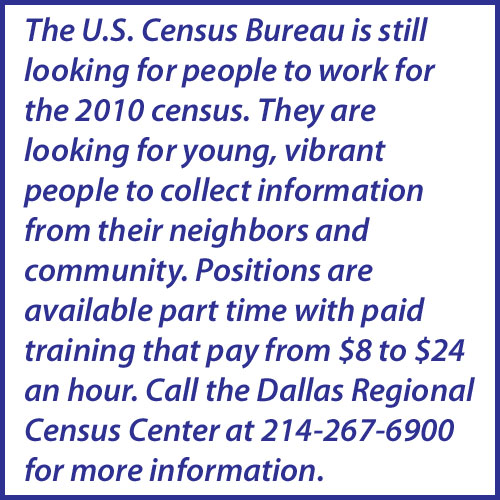Galveston reaches for higher numbers
Brad Denison
The Signal Staff
Nearly 45,000 people left Galveston after 2008’s Hurricane Ike devastated the island. Nearly 75 percent of the city was flooded by the storm surge and many homes still require repair before they are habitable again. All this makes the 2010 U.S. Census that much more important for Galveston. An accurate census count is important to Galveston’s recovery.
“We remain cautiously optimistic that we will reach a 50,000 count,” said Lloyd Rinderer, Galvesto n’s assistant city manager. “We are working to reach historically undercounted populations. If we are successful, the result will be a higher count.”
n’s assistant city manager. “We are working to reach historically undercounted populations. If we are successful, the result will be a higher count.”
The census data collected will be used in federal and state funding formulas that allocate resources to communities funding infrastructure, transportation and housing projects. An accurate count for Galveston will help the island continue to recover from Hurricane Ike.
Thousands of residents have not returned to Galveston. The Texas demographer’s office has estimated the island’s population to be between 46,000 and 48,000, and city officials agree with those figures.
The U.S. government is working with the city of Galveston by increasing the number of attempts to physically visit a residence that did not return a 2010 form. The U.S. Census Bureau has also conducted field visits to neighborhoods that were hit particularly hard to evaluate homes under construction.
Galveston is encouraging everyone to fill out and return their forms, and at the same time working to spread the message that all information supplied to the census is secure and confidential.
“Everyone’s information is protected by law,” said Eduardo Guity, media specialist for the U.S. Census Bureau. “Additionally, Galveston’s homeless will be counted through special night operations. The teams working on these special counts are meeting with social service agencies to really target this population.”
Many census workers on the island are Galvestonians. They are neighbors, family and friends who are familiar with the island and it’s people; which gives city officials hope of reaching a higher number of residents and a more accurate count.
“The data collected will be used by decision makers for the next 10 years and millions of dollars hang in the balance for Galveston Island,” Rinderer said.


Comments are closed, but trackbacks and pingbacks are open.